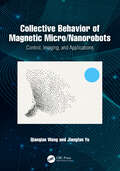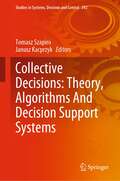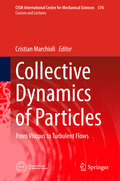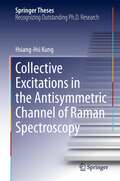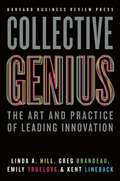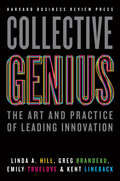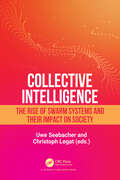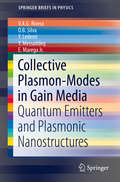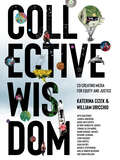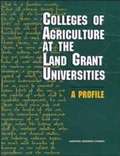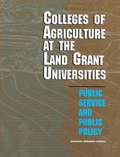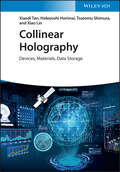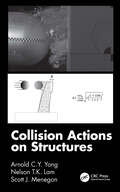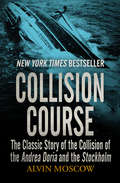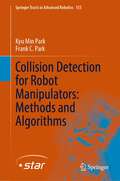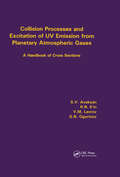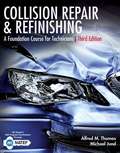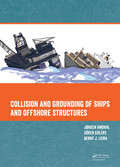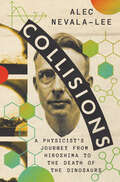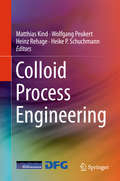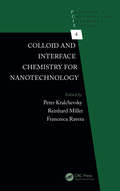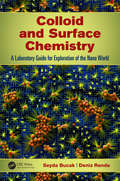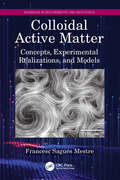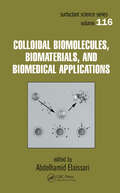- Table View
- List View
Collective Behavior of Magnetic Micro/Nanorobots: Control, Imaging, and Applications
by Jiangfan Yu Qianqian WangCollective Behavior of Magnetic Micro/Nanorobots: Control, Imaging, and Applications reviews recent advances in the design and construction of magnetic collective micro/nanorobot systems, and promotes the bridging of the gap between their theoretical investigation and practical applications. By summarizing the recent progress in control, imaging, and biomedical applications of collective micro/nanorobots, the authors show the big picture of micro/nanorobotics and the roadmap of collective micro/nanorobots. They then discuss the control, imaging, and biomedical applications of collective micro/nanorobots, respectively, demonstrating the state-of-the-art techniques and ideas for designing systems of collective micro/nanorobots that can help researchers have a better understanding and further stimulate the development of such an exciting field. This book is suitable for scientists, engineers, and students involved in the study of robotics, control, materials, and mechanical/electrical engineering.
Collective Decisions: Theory, Algorithms And Decision Support Systems (Studies in Systems, Decision and Control #392)
by Janusz Kacprzyk Tomasz SzapiroThis book is a token of appreciation for Professor Gregory E. Kersten (1949–2020), one of the most prominent and active researchers and scholars in the broadly perceived field of collective decisions, notably negotiations, the author of numerous influential papers, books, and edited volumes, a great scientist, mentor, and a loyal friend and colleague. This book contains some papers in the fields of group and collective decisions, voting, social choice, negotiations, and related topics, with examples of real applications. The authors are top researchers and scholars from all over the world whose life and academic career has been inspired and influenced by Professor Kersten.
Collective Dynamics of Particles: From Viscous to Turbulent Flows (CISM International Centre for Mechanical Sciences #576)
by Cristian MarchioliThe book surveys the state-of-the-art methods that are currently available to model and simulate the presence of rigid particles in a fluid flow. For particles that are very small relative to the characteristic flow scales and move without interaction with other particles, effective equations of motion for particle tracking are formulated and applied (e.g. in gas-solid flows). For larger particles, for particles in liquid-solid flows and for particles that interact with each other or possibly modify the overall flow detailed model are presented. Special attention is given to the description of the approximate force coupling method (FCM) as a more general treatment for small particles, and derivations in the context of low Reynolds numbers for the particle motion as well as application at finite Reynolds numbers are provided. Other topics discussed in the book are the relation to higher resolution immersed boundary methods, possible extensions to non-spherical particles and examples of applications of such methods to dispersed multiphase flows.
Collective Excitations in the Antisymmetric Channel of Raman Spectroscopy (Springer Theses)
by Hsiang-Hsi KungThis thesis contains three breakthrough results in condensed matter physics. Firstly, broken reflection symmetry in the hidden-order phase of the heavy-fermion material URu2Si2 is observed for the first time. This represents a significant advance in the understanding of this enigmatic material which has long intrigued the condensed matter community due to its emergent long range order exhibited at low temperatures (the so-called “hidden order”). Secondly and thirdly, a novel collective mode (the chiral spin wave) and a novel composite particle (the chiral exciton) are discovered in the three dimensional topological insulator Bi2Se3. This opens up new avenues of possibility for the use of topological insulators in photonic, optoelectronic, and spintronic devices. These discoveries are facilitated by using low-temperature polarized Raman spectroscopy as a tool for identifying optically excited collective modes in strongly correlated electron systems and three-dimensional topological insulators.
Collective Genius: The Art and Practice of Leading Innovation
by Kent Lineback Linda A. Hill Greg Brandeau Emily TrueloveWhy can some organizations innovate time and again, while most cannot? You might think the key to innovation is attracting exceptional creative talent. Or making the right investments. Or breaking down organizational silos. All of these things may help#151;but there’s only one way to ensure sustained innovation: you need to lead it#151;and with a special kind of leadership. Collective Genius shows you how. Preeminent leadership scholar Linda Hill, along with former Pixar tech wizard Greg Brandeau, MIT researcher Emily Truelove, and Being the Boss coauthor Kent Lineback, found among leaders a widely shared, and mistaken, assumption: that a #147;good” leader in all other respects would also be an effective leader of innovation. The truth is, leading innovation takes a distinctive kind of leadership, one that unleashes and harnesses the #147;collective genius” of the people in the organization. Using vivid stories of individual leaders at companies like Volkswagen, Google, eBay, and Pfizer, as well as nonprofits and international government agencies, the authors show how successful leaders of innovation don’t create a vision and try to make innovation happen themselves. Rather, they create and sustain a culture where innovation is allowed to happen again and again#151;an environment where people are both willing and able to do the hard work that innovative problem solving requires. Collective Genius will not only inspire you; it will give you the concrete, practical guidance you need to build innovation into the fabric of your business.
Collective Intelligence: The Rise of Swarm Systems and their Impact on Society
by Uwe Seebacher Christoph LegatUnlock the future of technology with this captivating exploration of swarm intelligence. Dive into the future of autonomous systems, enhanced by cutting-edge multi-agent systems and predictive research. Real-world examples illustrate how these algorithms drive intelligent, coordinated behavior in industries like manufacturing and energy. Discover the innovative Industrial-Disruption-Index (IDI), pioneered by Uwe Seebacher, which predicts industry disruptions using swarm intelligence. Case studies from media to digital imaging offer invaluable insights into the future of industrial life cycles.Ideal for AI enthusiasts and professionals, this book provides inspiring, actionable insights for the future. It redefines artificial intelligence, showcasing how predictive intelligence can revolutionize group coordination for more efficient and sustainable systems. A crucial chapter highlights the shift from the Green Deal to the Emerald Deal, showing how swarm intelligence addresses societal challenges.
Collective Plasmon-Modes in Gain Media: Quantum Emitters and Plasmonic Nanostructures (SpringerBriefs in Physics)
by V. A. G. Rivera O. B. Silva Y. Ledemi Y. Messaddeq E. MaregaThis book represents the first detailed description, including both theoretical aspects and experimental methods, of the interaction of rare-earth ions with surface plasmon polariton from the point of view of collective plasmon-photon interactions via resonance modes (metal nanoparticles or nanostructure arrays) with quantum emitters (rare-earth ions). These interactions are of particular interest for applications to optical telecommunications, optical displays, and laser solid state technologies. Thus, our main goal is to give a more precise overview of the rapidly emerging field of nanophotonics by means of the study of the quantum properties of light interaction with matter at the nanoscale. In this way, collective plasmon-modes in a gain medium result from the interaction/coupling between a quantum emitter (created by rare-earth ions) with a metallic surface, inducing different effects such as the polarization of the metal electrons (so-called surface plasmon polariton - SPP), a field enhancement sustained by resonance coupling, or transfer of energy due to non-resonant coupling between the metallic nanostructure and the optically active surrounding medium. These effects counteract the absorption losses in the metal to enhance luminescence properties or even to control the polarization and phase of quantum emitters. The engineering of plasmons/SPP in gain media constitutes a new field in nanophotonics science with a tremendous technological potential in integrated optics/photonics at the nanoscale based on the control of quantum effects. This book will be an essential tool for scientists, engineers, and graduate and undergraduate students interested not only in a new frontier of fundamental physics, but also in the realization of nanophotonic devices for optical telecommunication.
Collective Wisdom: Co-Creating Media for Equity and Justice
by William Uricchio Katerina CizekHow to co-create—and why: the emergence of media co-creation as a concept and as a practice grounded in equity and justice.Co-creation is everywhere: It&’s how the internet was built; it generated massive prehistoric rock carvings; it powered the development of vaccines for COVID-19 in record time. Co-creation offers alternatives to the idea of the solitary author privileged by top-down media. But co-creation is easy to miss, as individuals often take credit for—and profit from—collective forms of authorship, erasing whole cultures and narratives as they do so. Collective Wisdom offers the first guide to co-creation as a concept and as a practice, tracing co-creation in a media-making that ranges from collaborative journalism to human–AI partnerships. Why co-create—and why now? The many coauthors, drawing on a remarkable array of professional and personal experience, focus on the radical, sustained practices of co-creating media within communities and with social movements. They explore the urgent need for co-creation across disciplines and organization, and the latest methods for collaborating with nonhuman systems in biology and technology. The idea of &“collective intelligence&” is not new, and has been applied to such disparate phenomena as decision making by consensus and hived insects. Collective wisdom goes further. With conceptual explanation and practical examples, this book shows that co-creation only becomes wise when it is grounded in equity and justice.
Colleges of Agriculture at the Land Grant Universities: A Profile
by Committee on the Future of the Colleges of Agriculture in the Land Grant University SystemAlthough few Americans work as farmers these days, agriculture on the whole remains economically important--playing a key role in such contemporary issues as consumer health and nutrition, worker safety and animal welfare, and environmental protection. This publication provides a comprehensive picture of the primary education system for the nation's agriculture industry: the land grant colleges of agriculture.Colleges of Agriculture at the Land Grant Universities informs the public debate about the challenges that will shape the future of these colleges and serves as a foundation for a second volume, which will present recommendations for policy and institutional changes in the land grant system.This book reviews the legislative history of the land grant system from its establishment in 1862 to the 1994 act conferring land grant status on Native American colleges. It describes trends that have shaped agriculture and agricultural education over the decades--the shift of labor from farm to factory, reasons for and effects of increased productivity and specialization, the rise of the corporate farm, and more.The committee reviews the system's three-part mission--education, research, and extension service--and through this perspective documents the changing nature of funding and examines the unique structure of the U.S. agricultural research and education system. Demographic data on faculties, students, extension staff, commodity and funding clusters, and geographic specializations profile the system and identify similarities and differences among the colleges of agriculture, trends in funding, and a host of other issues.The tables in the appendix provide further itemization about general population distribution, student and educator demographics, types of degree programs, and funding allocations. Concise commentary and informative graphics augment the detailed statistical presentations. This book will be important to policymakers, administrators, educators, researchers, and students of agriculture.
Colleges of Agriculture at the Land Grant Universities: A Profile
by Committee on the Future of the Colleges of Agriculture in the Land Grant University SystemAlthough few Americans work as farmers these days, agriculture on the whole remains economically important--playing a key role in such contemporary issues as consumer health and nutrition, worker safety and animal welfare, and environmental protection. This publication provides a comprehensive picture of the primary education system for the nation's agriculture industry: the land grant colleges of agriculture.Colleges of Agriculture at the Land Grant Universities informs the public debate about the challenges that will shape the future of these colleges and serves as a foundation for a second volume, which will present recommendations for policy and institutional changes in the land grant system.This book reviews the legislative history of the land grant system from its establishment in 1862 to the 1994 act conferring land grant status on Native American colleges. It describes trends that have shaped agriculture and agricultural education over the decades--the shift of labor from farm to factory, reasons for and effects of increased productivity and specialization, the rise of the corporate farm, and more.The committee reviews the system's three-part mission--education, research, and extension service--and through this perspective documents the changing nature of funding and examines the unique structure of the U.S. agricultural research and education system. Demographic data on faculties, students, extension staff, commodity and funding clusters, and geographic specializations profile the system and identify similarities and differences among the colleges of agriculture, trends in funding, and a host of other issues.The tables in the appendix provide further itemization about general population distribution, student and educator demographics, types of degree programs, and funding allocations. Concise commentary and informative graphics augment the detailed statistical presentations. This book will be important to policymakers, administrators, educators, researchers, and students of agriculture.
Colleges of Agriculture at the Land Grant Universities: Public Service and Public Policy
by Committee on the Future of the Colleges of Agriculture in the Land Grant University SystemSince their inception in 1862, the U.S. land grant colleges have evolved to become the training ground for the nation's and the world's agriculturists. In this book, the committee examines the future of the colleges of agriculture in light of changing national priorities for the agricultural, food, and natural resource system. The effects of federal funding constraints also are examined, as are opportunities for growth presented by developments in science. The committee's preceding volume, Colleges of Agriculture at the Land Grant Universities: A Profile, is a compilation of the data that helped formulate the specific questions to be addressed. Colleges of Agriculture at the Land Grant Univerisities: Public Service and Public Policy is the deliberative report, rating conclusions and recommendations for institutional innovation and public policy. It addresses these and other questions: What education mission should colleges of agriculture adopt--and what strategies should they use--in light of significant changes in the agricultural complex? Research in agriculture is expected to respond to consumer demands, environmental concerns, world population growth, and increasing pressure on agricultural lands. Is the century-old structure of land grant university-based research up to the task? What is the role of extension in light of today's smaller farming communities and larger farming conglomerates? This volume is the culmination of a landmark evaluation of land grant colleges of agriculture, an American institution. This document will be of value to policymakers, administrators, and others involved in agricultural science and education.
Collinear Holography: Devices, Materials, Data Storage
by Xiao Lin Xiaodi Tan Hideyoshi Horimai Tsutomu ShimuraCollinear Holography Provides state-of-the-art, in-depth knowledge on the principles, devices, and applications of collinear holography In the era of Big Data, traditional magnetic and optical storage technologies are unable to satisfy the growing demand for reliable, scalable, cost-effective, and energy-efficient data storage. Holographic storage, considered the most promising technology for meeting the future storage needs of the information age, adopts a three-dimensional volume storage mode with a theoretical storage density vastly greater than conventional optical disks. Collinear Holography: Devices, Materials, Data Storage is a comprehensive, up-to-date account of the volumetric recording technology that combines large storage capacities with high transfer rates and exceptional reliability in optical data storage systems. Written by pioneers in the field, this authoritative book provides detailed coverage of the key technological approaches, theories, applications, systems, devices, and components in the rapidly advancing field of holographic data storage. Explains the principles of collinear holography, its different system setups, key devices and components, and current challenges Describes the materials, data and media formats, servo controls, and read/write characteristics of collinear holography storage systems Details collinear holography in current applications such as holo-printing, correlation, and encryption Discusses futures technologies including the Holographic Versatile Disc (HVD) and the The Holographic Versatile Card (HVC) Collinear Holography: Devices, Materials, Data Storage is an indispensable resource for applied physicists, electrical engineers, and materials and information scientists in both academia and industry.
Collision Actions on Structures
by Arnold C.Y. Yong Nelson T.K. Lam Scott J. MenegonThis textbook covers the collision of a moving, falling or flying object on a rigid barrier or a structural element, and the transmission of the transient action to the rest of the structural system. It is the only up-to-date book on this under-researched topic that confronts engineers on a day-to-day basis. The book deals with a range of real-life engineering problems and focuses on the application of knowledge and skillsets from structural analysis and structural dynamics. Fundamental principles and concepts on structural collision are first introduced, followed by their specific applications such as vehicular collision on bridge structures, boulder impact on rockfall barriers and collision by hail and windborne debris. Analytical solutions provided are in the form of closed-form expressions, which can be directly adopted in conventional manual calculations. The use of spreadsheets to simulate the dynamic response behaviour is also covered. • The only standalone book covering the topic from a civil engineering perspective • Practical guidance on real-life engineering problems, and use of computational and physical methods • Conveys methodology validated experimentally The book provides an excellent guide for practitioners and sets out fundamental principles for graduate students in civil, structural and mechanical engineering.
Collision Course: The Classic Story of the Collision of the Andrea Doria and the Stockholm (Lyons Press Ser.)
by Alvin MoscowThe definitive New York Times–bestselling account: &“One of the most intriguing and thought-provoking books about shipwreck since A Night to Remember&” (The Detroit News). One of the largest, fastest, and most beautiful ships in the world, the Andrea Doria was on her way to New York from her home port in Genoa. Departing from the United States was the much smaller Stockholm. On the foggy night of July 25, 1956, fifty-three miles southeast of Nantucket in the North Atlantic, the Stockholm sliced through the Doria&’s steel hull. Within minutes, water was pouring into the Italian liner. Eleven hours later, she capsized and sank into the ocean. In this &“electrifying book,&” Associated Press journalist Alvin Moscow, who covered the court hearings that sought to explain the causes of the tragedy and interviewed all the principals, re-creates with compelling accuracy the actions of the ships&’ officers and crews, and the terrifying experiences of the Doria&’s passengers as they struggled to evacuate a craft listing so severely that only half of its lifeboats could be launched (Newsweek). Recounting the heroic, rapid response of other ships—which averted a catastrophe of the same scale as that of the Titanic—and the official inquest, Moscow delivers a fact-filled, fascinating drama of this infamous maritime disaster, and explains how a supposedly unsinkable ship ended up at the bottom of the sea. In the New York Times Book Review, Walter Lord, author of A Night to Remember, said of Collision Course: &“More than a magnificent analysis of the accident and sinking; it is a warmly compassionate document, full of understanding for the people on each side.&”
Collision Detection for Robot Manipulators: Methods and Algorithms (Springer Tracts in Advanced Robotics #155)
by Kyu Min Park Frank C. ParkThis book provides a concise survey and description of recent collision detection methods for robot manipulators. Beginning with a review of robot kinodynamic models and preliminaries on basic statistical learning methods, the book covers fundamental aspects of the collision detection problem, from collision types and collision detection performance criteria to model-free versus model-based methods, and the more recent data-driven learning-based approaches to collision detection. Special effort has been given to describing and evaluating existing methods with a unified set of notation, systematically categorizing these methods according to a basic set of criteria, and summarizing the advantages and disadvantages of each method. This book is the first to comprehensively organize the growing body of learning-based collision detection methods, ranging from basic supervised learning methods to more advanced approaches based on unsupervised learning and transfer learning techniques. Step-by-step implementation details and pseudocode descriptions are provided for key algorithms. Collision detection performance is measured with respect to both conventional criteria such as detection delay and the number of false alarms, as well as criteria that measure generalization capability for learning-based methods. Whether it be for research or commercial applications, in settings ranging from industrial factories to physical human–robot interaction experiments, this book can help the reader choose and successfully implement the most appropriate detection method that suits their robot system and application.
Collision Processes and Excitation of UV Emission from Planetary Atmospheric Gases: A Handbook of Cross Sections
by SV AvakyanOver the past few decades, the excitation and ionization of atmospheric gases has become an area of intense research. A large amount of data have been accumulated concerning the various elementary processes which occur when photons, electrons and ions collide with atoms and molecules. This scattered information has now been collected in a handbook for the first time, and the authors give a critical analysis of relevant data. This book is a comprehensive and detailed study of the available information and is distinguished by the following outstanding features: the consideration of a large number of atmospheric constituents, including H^O2, H, N^O2, N, O^O2, O, CO, CO^O2, H^O2O, HCl and some hydrocarbons the maximum number of space particles, including magnetospheric particles, are considered as projectiles: photons, electrons, hydrogen atoms, protons and helium ionsthe energy range under study corresponds to the real spectrum of cosmic fluxes, from threshold values for elementary processes up to several thousand keV the recommended values of cross sections, obtained from analysis of the available experimental data, are given in the handbook and their accuracy is estimated. These features make the handbook particularly valuable to specialists in the aeronomy of planets, comets and active perturbations, as well as to experimentalists and theoreticians working in the fields of plasma physics, atomic and molecular physics, physics of the upper atmosphere, chemical physics, optics and spectroscopy.
Collision Repair and Refinishing: A Foundation Course For Technicians
by Alfred M. Thomas Michael JundNIMAC-sourced textbook
Collision and Grounding of Ships and Offshore Structures
by Bernt J. Leira Sören Ehlers Jørgen AmdahlCollision and Grounding of Ships and Offshore Structures contains the latest research results and innovations presented at the 6th International Conference on Collision and Grounding of Ships and Offshore Structures (Trondheim, Norway, 17-19 June 2013). The book comprises contributions made in the field of numerical and analytical analysis of
Collisions: A Physicist's Journey from Hiroshima to the Death of the Dinosaurs
by Alec Nevala-LeeFrom the acclaimed biographer of Buckminster Fuller, a riveting biography of the Nobel Prize–winning physicist who became the greatest scientific detective of the twentieth century. To his admirers, Luis W. Alvarez was the most accomplished, inventive, and versatile experimental physicist of his generation. During World War II, he achieved major breakthroughs in radar, played a key role in the Manhattan Project, and served as the lead scientific observer at the bombing of Hiroshima. In the decades that followed, he revolutionized particle physics with the hydrogen bubble chamber, developed an innovative X-ray method to search for hidden chambers in the Pyramid of Chephren, and shot melons at a rifle range to test his controversial theory about the Kennedy assassination. At the very end of his life, he collaborated with his son to demonstrate that an asteroid impact was responsible for the extinction of the dinosaurs, igniting a furious debate that raged for years after his death. Alvarez was also a combative and relentlessly ambitious figure—widely feared by his students and associates—who testified as a government witness at the security hearing that destroyed the public career of his friend and colleague J. Robert Oppenheimer. In the first comprehensive biography of Alvarez, Alec Nevala-Lee vividly recounts one of the most compelling untold stories in modern science, a narrative overflowing with ideas, lessons, and anecdotes that will fascinate anyone with an interest in how genius and creativity collide with the problems of an increasingly challenging world.
Colloid Process Engineering
by Heike P. Schuchmann Matthias Kind Wolfgang Peukert Heinz RehageThis book deals with colloidal systems in technical processes and the influence of colloidal systems by technical processes. It explores how new measurement capabilities can offer the potential for a dynamic development of scientific and engineering, and examines the origin of colloidal systems and its use for new products. The future challenges to colloidal process engineering are the development of appropriate equipment and processes for the production and obtainment of multi-phase structures and energetic interactions in market-relevant quantities. The book explores the relevant processes and for controlled production and how they can be used across all scales.
Colloid and Interface Chemistry for Nanotechnology (Progress in Colloid and Interface Science)
by Reinhard Miller Peter Kralchevsky Francesca RaveraColloid and interface science dealt with nanoscale objects for nearly a century before the term nanotechnology was coined. An interdisciplinary field, it bridges the macroscopic world and the small world of atoms and molecules. Colloid and Interface Chemistry for Nanotechnology is a collection of manuscripts reflecting the activities of research te
Colloid and Surface Chemistry: A Laboratory Guide for Exploration of the Nano World
by Seyda Bucak Deniz RendeWith principles that are shaping today's most advanced technologies, from nanomedicine to electronic nanorobots, colloid and interface science has become a truly interdisciplinary field, integrating chemistry, physics, and biology. Colloid and Surface Chemistry: Exploration of the Nano World- Laboratory Guide explains the basic principles of colloi
Colloidal Active Matter: Concepts, Experimental Realizations, and Models (Advances in Biochemistry and Biophysics)
by Francesc Sagués MestreWhat do bird flocks, bacterial swarms, cell tissues, and cytoskeletal fluids have in common? They are all examples of active matter. This book explores how scientists in various disciplines, from physics to biology, have collated a solid corpus of experimental designs and theories during the last two decades to decipher active systems. The book addresses, from a multidisciplinary viewpoint, the field of active matter at a colloidal scale. Concepts, experiments, and theoretical models are put side by side to fully illuminate the subtilities of active systems. A large variety of subjects, from microswimmers or driven colloids to self-organized active fluids, are analysed within a unified perspective. Generic collective effects of self-propelled or driven colloids, such as motility-induced flocking, and new paradigms, such as the celebrated concept of active nematics in reconstituted protein-based fluids, are discussed using well-known experimental scenarios and recognized theories. Topics are covered with rigor and in a self-consistent way, reaching both practitioners and newcomers to the field. The diversity of topics and conceptual challenges in active matter have long hampered the chance to explore the field with a general perspective. This monograph, the first single-authored title on active matter, is intended to fill this gap by bridging disparate experimental and theoretical interests from colloidal soft matter to cell biophysics.
Colloidal Biomolecules, Biomaterials, and Biomedical Applications (Surfactant Science)
by Abdelhamid ElaissariColloidal Biomolecules, Biomaterials, and Biomedical Applications is an authoritative presentation of established and recent techniques promising to revolutionize the areas of biomedical diagnostics, therapeutics, pharmaceutics, and drug delivery. This exceptional book details an original homogeneous assay for biomolecule detection and capture through duplex colloid particles, as well as new methods for utilizing peptides in particle agglutination. Featuring contributions from over 30 prominent researchers, it investigates physical studies of the agglutination of sensitive latexes, and indicates benefits to drug delivery through supercritical fluid process production of polymer particles.
